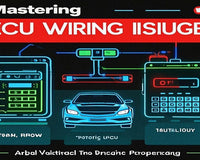
BMW tuning is the process of modifying your car to improve its performance. Typically it involves adjusting the engine management system to get more power from the engine.
Tuning a BMW involves several key steps that can enhance its performance, handling, and overall driving experience.
Engine Tuning:
ECU Remapping: One of the most effective ways to increase horsepower and torque is by remapping the Engine Control Unit (ECU). This process adjusts the fuel-air mixture and ignition timing for optimal performance. Many programmers offer model-specific remapping. For example, VVDI-Prog programmer can get free for BMW ISN read function, support chip data verify, check blank fun.

In addition, XPROG V5.55 programmer especially for BMW CAS4 DECRYPTION. Without USB Dongle,software is not encrypted.

Performance Chips: Installing a car performance chip can also enhance engine performance by optimizing various parameters without needing extensive modifications.

Exhaust System Upgrades:
High-Performance Exhaust: Upgrading to a high-performance exhaust system can improve airflow, reduce back pressure, and enhance engine sound. Look for systems that are specifically designed for your BMW model.
Downpipes: For turbocharged models, replacing the factory downpipe with a high-flow version can significantly increase power output.
Intake Modifications:
Cold Air Intake: Installing a cold air intake system allows the engine to breathe better by drawing in cooler air, which can lead to improved combustion efficiency and power gains.
High-Performance Filters: Upgrading to high-performance air filters can also help improve airflow into the engine.
Suspension Tuning:
Upgraded Shocks and Struts: Replacing factory shocks with adjustable or performance-oriented options can greatly enhance handling and ride quality.
Lowering Springs or Coilovers: Lowering your BMW can improve its center of gravity, leading to better handling dynamics. Coilovers allow for adjustable ride height and damping settings.

Brake System Enhancements:
Performance Brake Pads and Rotors: Upgrading to high-performance brake pads and rotors can improve stopping power and reduce brake fade during spirited driving.
Stainless Steel Brake Lines: These lines provide better pedal feel and reduce expansion under pressure compared to rubber lines.
Wheels and Tires:
Lightweight Wheels: Switching to lightweight alloy wheels can reduce unsprung weight, improving acceleration and handling.
Performance Tires: Investing in high-quality performance tires will enhance grip and stability during cornering.
Software Updates:
Regularly check for software updates from BMW or aftermarket tuners that may improve vehicle performance or fix known issues.
Regular Maintenance:
Ensure that your BMW is well-maintained with regular oil changes, filter replacements, and inspections. A well-maintained vehicle performs better overall.

One of the main reasons why people tune their BMWs is for improved performance. Tuning can help increase power, torque, and throttle response, which can make your BMW feel more responsive and fun to drive. Another benefit of tuning your BMW is better fuel economy. By making changes to the engine’s programming, you can optimise it for fuel efficiency, which can save you money at the pump.










